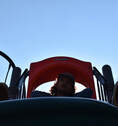by Adam D. Weeks
After the poem by Kimberly Grey
- and continued on / as things unliving and for a short while, as
trees—in the ground, their systems of roots intertwine to send
nutrients and distress signs in response to drought or
invading insects. Trees send signals, electrical and hormonal—they
spread pheromones through the air to sink into each other.
They’re social; they communicate even if they can’t turn and
open their mouths. Still, they talk. - swerved / towards the bathtub / and were, for a day, droplings
of bath water and tiny blond hairs--swerve, defined as an
abrupt change of direction, suggests heading somewhere and
not arriving. Swerve as a verb is about all the ways we try to
avoid loss—as a noun, the image of us doing so. Imagine
yourself sitting with your fingers tangled in their hair, eyes on
the sun slowly dipping towards the bottom of the window,
each soft movement of yourself against theirs echoed in the
sound of water sliding on water. There are so many ways to
pass time. - our hybrid selves: both dirty and divine—also known as both
dirty and clean, both reaching and not reaching. We’re all
always losing something or, in other words, we define the
functions of the body best when we look at all the organs. - we began as bone bits and once we tired, we began again / as
a two-lover herd—every ten years, we remodel our skeletons,
remove old pieces of bones and replace them with new. We’re
always reintroducing ourselves, finding new pieces to put in
our cavities—we’re always looking for something to stand up
against. Over the years, our young 300 bones become 206,
small sections of cartilage fixed with capillaries and
osteoblasts to fuse us together. We know how to remake
ourselves. - your square / back of wanting, your yellowsun gut—there are
at least twenty different ways to say want. It can be called
absence or yearn; it can be your yellowsun gut—the thing we
always want to wake to. Other synonyms include itch, hanker,
hunger, thirst. Some say salivate. The body knows what it
needs, growing lighter in the absence of light, wanting sun. It
always knows if something is missing. - a thousand different shapes before we are the shapes we die in
—some say bodies are shaped like fruits: apples, bananas,
pears if your hips are this wide; to be boiled down and eaten.
Others call it rectangular, ovular, or circular, sometimes
describe it as an hourglass, and we’ve been so many shapes
already—we’re made small, then large, we’re soft-lit rooms,
crumpled sheets, berries with bites taken out. When we pose
for pictures, we know to sit just the way they tell us; we know
what to do when we hear freeze. - Soon we’ll be burning / it for warmth--hypothermia occurs
within ten minutes in minus-thirty degrees Fahrenheit, five
minutes at fifty below. There are three stages: first, shivering
and reduced circulation. Then a faint pulse, slowed breathing,
irritability, confusion. There may be drowsiness. In the
advanced stage, respiration and pulse are slow, weak, or
totally absent; there is potential for unconsciousness--
ironically, the body may even feel like it’s getting hot. We can
only wait so long to chop the trees for wood. - things to teach us leaving; / there are a million kinds of loss
—a memory floods the body like a hatchet hits the base of a
tree: it brings the whole damn thing down. There are only four
ways to die: high temperature, oxygen starvation, chemical
toxin, and physical damage. Have you ever felt it like this?
Standing from the tub to feel nothing but the air on the
porcelain, seeing someone asleep and shutting the door,
stepping down a stair to feel the room grow cold from a
window left open. There are only four ways to die and still
a million kinds of loss. I could love you more easily as a pale
bird, circling.
- breathing and not breathing—in other words, how we deal
with it: we do, then don’t, then do again.

Adam D. Weeks has a BA in Creative Writing from Salisbury University and is currently an elementary literacy tutor in Baltimore. He is the social media manager for The Shore, a poetry reader for Quarterly West, and a founding editor of Beaver Magazine. He won the 2022 Third Wednesday Poetry Contest, has been a Pushcart Prize nominee, and has poetry published or forthcoming in Fugue, Poet Lore, Sugar House Review, Sweet: A Literary Confection, Sycamore Review, Thrush, and elsewhere.
